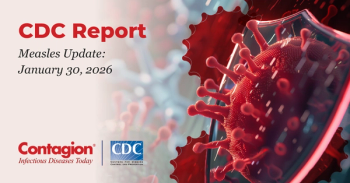
Risk of Myocarditis Higher After COVID-19 Infection Than After Vaccination
A study published this week by the American Heart Association found myocarditis was more common after COVID-19 infection than after COVID-19 vaccination.
One
“We found that across this large dataset, the entire COVID-19-vaccinated population of England during an important 12-month period of the pandemic when the COVID-19 vaccines first became available, the risk of myocarditis following COVID-19 vaccination was quite small compared to the risk of myocarditis after COVID-19 infection,” said statistician Martina Patone, PhD, the first author of the study.
The self-controlled case series study included persons 13 years and older who were vaccinated against COVID-19 in England between December 1, 2020, and December 15, 2021. The dataset included nearly 43 million people who had received at least 1 dose of the AstraZeneca (ChAdOx1), Moderna (mRNA-1273), or Pfizer-BioNTech (BNT162b2) 2-dose COVID-19 vaccine.
Of the 43 million, over 21 million had received at least 2 doses of a primary vaccine series and 1 booster shot. Nearly 6 million of all participants tested positive for COVID-19, either before or after vaccination, during the study period. The investigators stratified participants by individual demographic information, including age and sex.
A total of 2861, or 0.007% or people were hospitalized or died with myocarditis during the study period. In 617 of these cases, myocarditis occurred less than a month after COVID-19 vaccination, and 514 of the cases were hospitalized.
Notably, people infected with COVID-19 before receiving a COVID-19 vaccine were 11 times more at risk of myocarditis. The risk of COVID-19 infection-related myocarditis was halved after receiving at least 1 dose of a COVID-19 vaccine.
The risk of myocarditis did increase after a first dose of any of the 3 COVID-19 vaccines. However, vaccine-associated myocarditis was less likely than infection-associated myocarditis, except after a second dose of the Moderna vaccine.
Myocarditis risk was higher on days 1-28 after the second dose of Moderna, a risk that persisted after Moderna booster vaccination. The investigators noted, however, that the Moderna recipients tended to be younger than the other vaccine recipients; myocarditis is known to be more likely in younger persons and this could have skewed the results.
“It is important for the public to understand that myocarditis is rare, and the risk of developing myocarditis after a COVID-19 vaccine is also rare,” said Nicholas Mills, PhD, a cardiology chair at the University of Edinburgh and a coauthor of the study. “This risk should be balanced against the benefits of the COVID-19 vaccines in preventing severe COVID-19 infection. It is also crucial to understand who is at a higher risk for myocarditis and which vaccine type is associated with increased myocarditis risk.”
The study authors noted the risk of myocarditis “remains modest” even after sequential COVID-19 vaccine doses. However, myocarditis risk is higher in young men, particularly after receiving a second dose of Moderna.
Newsletter
Stay ahead of emerging infectious disease threats with expert insights and breaking research. Subscribe now to get updates delivered straight to your inbox.



































































































































